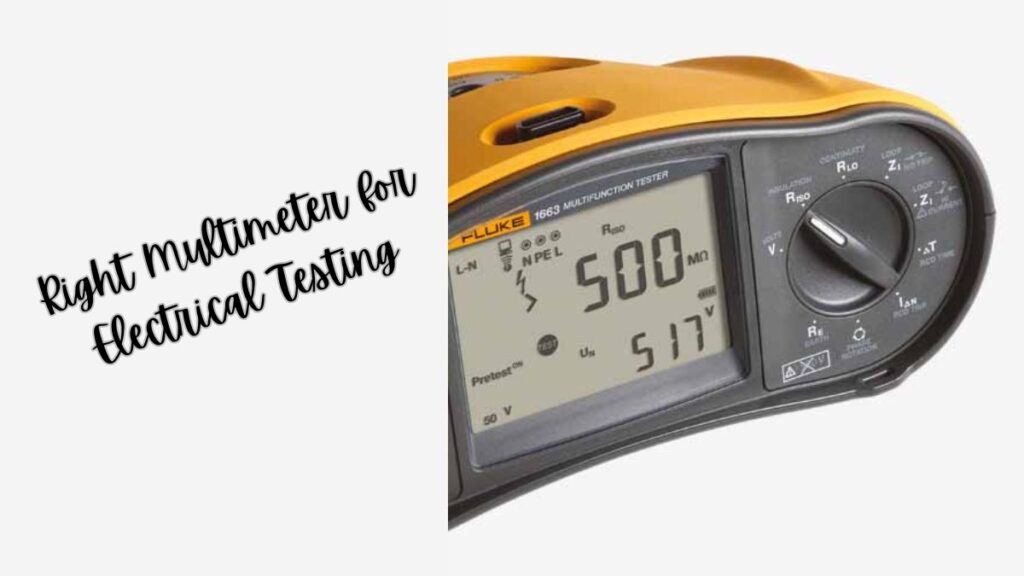Electrical testing depends on having dependable results. All electricians and electrical system users depend heavily on a quality multimeter to perform their work. Safe electrical evaluation and circuit maintenance depend entirely on right multimeters for measuring voltage currents resistances and other electrical parameters. Choosing a proper multimeter becomes hard because various products offer different features. This article helps you understand what makes up an excellent multimeter for electrical tests.
1. Understand Your Requirements
You need to know the exact test tasks before choosing a multimeter for purchase. Multimeters serve different evaluation purposes depending on what type of electrical work you perform whether you work at home or in large industrial environments. This summary explains the steps you need to take to know your selection requirements.
Homeowners who need standard battery tests and wall conditions can find a basic digital multimeter (DMM) effective for daily use.
Professional electrical contractors working with commercial electrical projects will need advanced electronic tools because their installations deal with demanding power systems.
Mechanics who test vehicle electrical systems should use a multimeter built for auto components because it has features made to work in motor vehicle diagnostic tasks.
2. Choose Between Digital or Analog Multimeters
Multimeters come in two basic forms: digital and analog. Although they are used for the same function, they are built and function differently.
- Digital Multimeters (DMM): Digital multimeters are used most extensively and are relatively simpler to operate. They display numerical values on a digital screen, and therefore they are accurate and easy to read. DMMs are also more precise and possess more sophisticated features such as auto-ranging, which automatically chooses the correct measurement range for the circuit.
- Analog Multimeters: Analog multimeters have a moving needle across a scale to display readings. Although less popular today, some still prize analog multimeters for their capacity to display trends in readings over time (e.g., voltage varying). Analog meters will be more likely to withstand rough treatment but perhaps harder to correctly utilize.
For most users, a digital multimeter will be the best choice due to its ease of use, accuracy, and versatility.
3. Consider the Measurement Range and Accuracy
The most critical thing to look for is the range of measurements the multimeter is capable of. Electrical systems are extremely diverse, and you want to have the proper range for what you are about to do.
- Voltage (AC/DC): Make sure that the multimeter can be used to measure AC (alternating current) and DC (direct current) voltages. AC voltage is on household wiring, and DC is on batteries and in the automobile.
- Current (Amps): Current may also be read as amps (A) by a multimeter but is limited on the model type. A 10 amp-or-less multimeter will suffice in most homes. Industrial or vehicle multimeters require more current ability.
- Resistance and Continuity: Resistance readings are helpful for diagnosing faults such as a faulty wire or a shorted circuit. Most multimeters also contain a continuity test, which will produce an audible beep if there is a path of direct current.
- Accuracy: Accuracy is expressed as a percentage of the reading with an addition of digits (e.g., ±0.5% + 2 digits). When purchasing a multimeter, find one with a very high level of accuracy, particularly if you are going to use it in professional applications where high levels of precision are required.
4. Look for Additional Features
Other than the essentials, there are a few things that will make your multimeter even more useful. These include:
- Auto-Ranging: Auto-ranging multimeters automatically range based on the measurement value you’re attempting to read. This will save time and provide accurate results without needing to switch to the proper range manually.
- Data Logging and Connectivity: Some advanced models offer the ability to record and store measurement data, which can be useful for diagnosing issues over time or in complex systems. Certain models also come with Bluetooth or USB connectivity to allow for easy transfer of data to computers or smartphones for analysis.
- True RMS (Root Mean Square): There are also some of the more advanced models that allow logging and storing of the measurement data, which is helpful to identify problems over time or in intricate systems. There are even some models with Bluetooth or USB connectivity for convenient transfer of data to smartphones or computers for analysis.
- Temperature Measurement: When measuring AC voltage and current precisely, especially in non-sinusoidal waveform applications, one needs to choose a True RMS multimeter. This is a must when measuring the true value of AC signals that are not a pure sine wave.
- Backlit Display: If you’re working in low-light conditions, a backlit display can make reading your multimeter’s results much easier.
5. Durability and Safety Features
Safety should be great while using electricity, and find a multimeter that carries some form of built-in protection for safety in order to shield yourself and also the tool as well. The CAT-rated multimeter (Category I, II, III, IV) measures how safe the multimeter is against electrical surges and spikes.
- CAT III/IV ratings are recommended for industrial and high-voltage applications.
- CAT II is suitable for residential and light commercial environments.
Additionally, consider a model with fuse protection and overload protection to safeguard against electrical surges.
6. Brand and Price
Choosing a reputable brand is crucial when purchasing electrical test equipment. Well-known brands like Fluke, Keysight, and Klein Tools offer high-quality, reliable multimeters with excellent customer support. While it’s tempting to opt for a budget model, investing in a high-quality multimeter can save you money in the long run by offering greater durability, accuracy, and safety features.
Conclusion
Choosing the right multimeter for electrical testing depends on your specific needs, level of expertise, and the type of work you’ll be doing. By considering factors like the measurement range, accuracy, special features, and safety ratings, you can find the multimeter that best suits your requirements. Whether you’re troubleshooting a simple circuit in your home or conducting complex electrical tests in an industrial environment, the right multimeter is a crucial tool for ensuring safe and accurate measurements.







